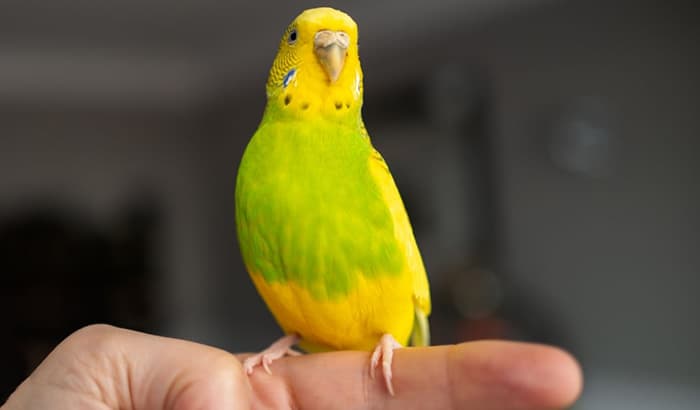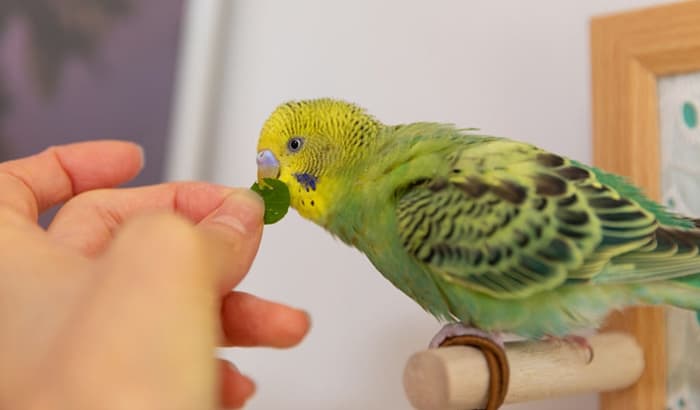Lovebirds are small, colorful, and loveable species that are more sociable than you might think. They enjoy the company of humans and love to play on their owner’s shoulders. Therefore, they are wonderful companions that can cheer you up.
These active birds love to eat fresh fruit and vegetables, which is something a new owner should know about when adopting them.
Do lovebirds make good pets, then? It depends on different people’s preferences. So, read this article to find out if you want them to be yours.
Why Lovebirds Make Good Pets
Lovebirds become the favorite pets of many homes due to various reasons. Bring a lovebird home if you also find comfort in their company.
- Lovebirds or pocket parrots are affectionate pets, as their name suggests. Also, these birds are so friendly that it takes new owners a shorter time to earn the love of these pets
- Secondly, their personalities are the best, since they are easy-going birds. As they love to be in their owners’ company and want to be cuddled often, lovebirds can lift up our mood rather well.
- They do not need much care in terms of food and living conditions. Therefore, they are rather easy to take care of, even if we are busy sometimes
- For instance, love birds can eat healthy seeds and be in good shape without requiring too many treats or extra vitamins like other parrots. Hence, compared to other pets, they do not tire out their owners
- Lovebirds also make noise often, so living with lovebirds can be fun, especially when you live alone! When lovebirds are happy, they will sing and whistle a lot! This can be cute if you love bird songs. They can greet you in the morning or ease your sore mood after a tedious and tiring workday
- Besides, they are utterly gorgeous species with bright-colored feathers. They can be a lovely addition to your family, flaunting their cheerful appearance to greet you home. As they come in many different colors, there should be one out there that would fit your personality and lifestyle
Overall, lovebirds make great pets for those who want an interactive bird that does not need too much care.
Still, there are reasons why some people hesitate to have them as pets, which is totally understandable:
- These noisy creatures sometimes annoy others around you, so some prefer silent birds such as budgies.
- They require love and affection from you, so you need some time to tame them at first, then cuddle with them often. We should not ignore these loving pets.
These noisy creatures sometimes annoy others around you, so some prefer silent birds such as budgies.
They require love and affection from you, so you need some time to tame them at first, then cuddle with them often. We should not ignore these loving pets.
- They love bananas, pears, apples, green peas, corn on the cob, or canned veggies that have been well rinsed. Also, be careful about giving them watermelon or citrus fruit such as oranges or grapefruit because these are acidic and may upset the stomachs of some parrots
- They also enjoy birdseed, but it is important to not give them too much because it can make them sick
- Lovebirds need a lot of water, so be sure to always keep their water dish full for your bird, so they stay hydrated throughout the day
- You can also give your lovebird a bath in a shallow dish once or twice a week. This will help keep their feathers clean and healthy
Can Lovebirds Drink Milk?
Lovebirds can drink milk, but they should only eat it in moderation.
Can Lovebirds Eat Strawberries or Blueberries?
They love strawberries and blueberries, so give them as many as you want!
Frequently Asked Questions
Can Lovebirds and Parakeets Live Together?
Parakeets love the same types of foods as lovebirds, including fruit, seeds, and veggies, because they are both considered “seed-eating birds.” This means that you can have lovebirds with parakeets.
Still, you should provide lovebirds and parakeets with different types of food to ensure that they both get the nutrients they need. With proper care, lovebirds and parakeets can make beautiful companions for one another.
- Provide lovebirds with a diet of fresh fruit, vegetables, and seeds
- Provide parakeets with a diet of birdseed mix, pellets, and fresh fruit/veggies
Yet, lovebirds need some time to get along well with other lovebirds and will often fight with each other. Parakeets, on the other hand, love to have friends and play together.
If you want to have lovebirds and parakeets living in the same birdcage, you must get a large birdcage that has enough room for both of them to move around without feeling cramped or threatened. Also, lovebirds and parakeets can live in harmony if they are introduced to each other while still young.
Can Lovebirds Talk?
Lovebirds can imitate human speech and other noises and mimic other sounds, but they cannot speak like humans or parrots.
Instead, they produce these noises because of an evolutionary need; lovebirds make loud calls to attract mates across long distances. This is why it’s so common for lovebird owners to hear them making all kinds of different sounds throughout the day – even if there aren’t any around!
How do Lovebirds Sleep?
What’s important when it comes to lovebirds’ sleeping habits is how much space they need for bedding at night.
Lovebirds are social animals, so they love to sleep with each other. They love curling up on something cozy just as much as we all do! If your lovebirds sleep in different parts of the cage, make sure they still have a place to snuggle up together during the night. This can be as simple as putting a soft cloth or T-shirt in their sleeping area.
However, if your lovebirds are one of those pairs that like to keep their distance while they slumber, don’t worry. They’ll still get their rest. Just put some soft bedding in their sleeping area.
No matter how your lovebirds sleep, it’s important to give them at least 12 hours to rest per day. This promotes healthy breeding and molting habits.
When do Lovebirds Lay Eggs?
If not mated, lovebirds still lay an egg after reaching 9 to 12 months old. But, of course, it is an infertile egg.
Then, after mating, how many eggs do lovebirds lay?
In truth, around 9 – 10 days after they mate, lovebirds lay an egg every other day and fill a clutch of four to six eggs. Then, after about 25 days of incubating, the eggs hatch. The time it takes for lovebird chicks to hatch depends on how many there are and can range between ten days and two weeks.
Once they leave the nest, lovebird parents feed them until they’re ready for life outside the family – a transition usually occurs around 12-14 days after birth but can take as long as 25 days.
Where to Buy a Lovebird?
If you’re looking to buy a lovebird, there are a few things you need to keep in mind.
First, decide where to buy your lovebird. There are a few different options available; ask yourself suitable questions and consider them thoroughly. Budget is one thing; if you want only one bird, then should it be male or female? As you look for a pair of lovebirds, do you want them to mate and build a family later?
You can buy lovebirds from pet stores, breeders, or online retailers. Pet stores are the most convenient place to visit, but their prices tend to be more expensive than other options.
Breeders typically have lower prices but may be harder to find. Online retailers offer the widest selection of lovebirds, but you’ll need to be careful about who you buy from.
Conclusion
A common misconception is that lovebirds are time-consuming and hard to care for. However, in reality, they make fabulous pets!
With proper attention and time devoted to their needs, your feathered friend will be happy and healthy with you forever. If this sounds like something you’d enjoy doing daily, then consider adopting one of these beautiful creatures today!


